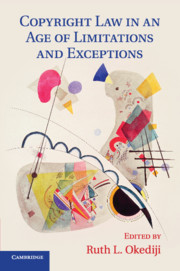Book contents
- Copyright Law in an Age of Limitations and Exceptions
- Copyright Law in an Age of Limitations and Exceptions
- Copyright page
- Dedication
- Contents
- Author Biographies
- Preface
- Introduction
- 1 Justifications for Copyright Limitations and Exceptions
- 2 The Role of the Author in Copyright*
- 3 A Few Observations about the State of Copyright Law
- 4 Fetishizing Copies
- 5 Copyright in a Digital Ecosystem
- 6 The Canadian Copyright Story
- 7 (When) Is Copyright Reform Possible?
- 8 Fair Use and Its Politics – at Home and Abroad
- 9 Flexible Copyright
- 10 The Limits of “Limitations and Exceptions” in Copyright Law
- 11 Lessons from CopyrightX
- 12 Rights on the Border: The Berne Convention and Neighbouring Rights
- 13 How Oracle Erred
- 14 Reframing International Copyright Limitations and Exceptions as Development Policy
- Index
2 - The Role of the Author in Copyright*
Published online by Cambridge University Press: 07 June 2017
- Copyright Law in an Age of Limitations and Exceptions
- Copyright Law in an Age of Limitations and Exceptions
- Copyright page
- Dedication
- Contents
- Author Biographies
- Preface
- Introduction
- 1 Justifications for Copyright Limitations and Exceptions
- 2 The Role of the Author in Copyright*
- 3 A Few Observations about the State of Copyright Law
- 4 Fetishizing Copies
- 5 Copyright in a Digital Ecosystem
- 6 The Canadian Copyright Story
- 7 (When) Is Copyright Reform Possible?
- 8 Fair Use and Its Politics – at Home and Abroad
- 9 Flexible Copyright
- 10 The Limits of “Limitations and Exceptions” in Copyright Law
- 11 Lessons from CopyrightX
- 12 Rights on the Border: The Berne Convention and Neighbouring Rights
- 13 How Oracle Erred
- 14 Reframing International Copyright Limitations and Exceptions as Development Policy
- Index
Summary
Two encroachments, one long-standing, the other a product of the digital era, cramp the author’s place in copyright today. First, most authors lack bargaining power; the real economic actors in the copyright system have long been the publishers and other exploiters to whom authors cede their rights. These actors may advance the figure of the author for the moral luster it lends their appeals to lawmakers, but then may promptly despoil the creators of whatever increased protections they may have garnered. Second, the advent of new technologies of creation and dissemination of works of authorship not only threatens traditional revenue models but also calls into question whatever artistic control the author may – or should – retain over her work. After reviewing these challenges, I will consider legal measures to protect authors from leonine contracts, as well as measures in the marketplace to obtain compensation for the exploitation of their rights, in order to assure authors better remuneration, and more power over the ways their works encounter the public.
The author’s place in the future of copyright (assuming copyright has a future) will not be assured until the full range of her interests, monetary and moral, receives both recognition and enforcement. Online micropayment and other systems for remunerating individual authors (including by means of collective licensing), albeit often embryonic, hold promise. But will these new means of remunerating authors (or for that matter older business models that, while often divesting authors of their rights, also often afforded them an income stream) remain viable in a digital environment in which paying for creativity increasingly seems an act of largesse? Most fundamentally, we need to appreciate authorship, and to recognize that a work in digital form is a thing of value, lest the old adage that “information” (meaning, works of authorship) “wants to be free” presage works of authorship that don’t “want” to be created.
- Type
- Chapter
- Information
- Copyright Law in an Age of Limitations and Exceptions , pp. 60 - 84Publisher: Cambridge University PressPrint publication year: 2017

